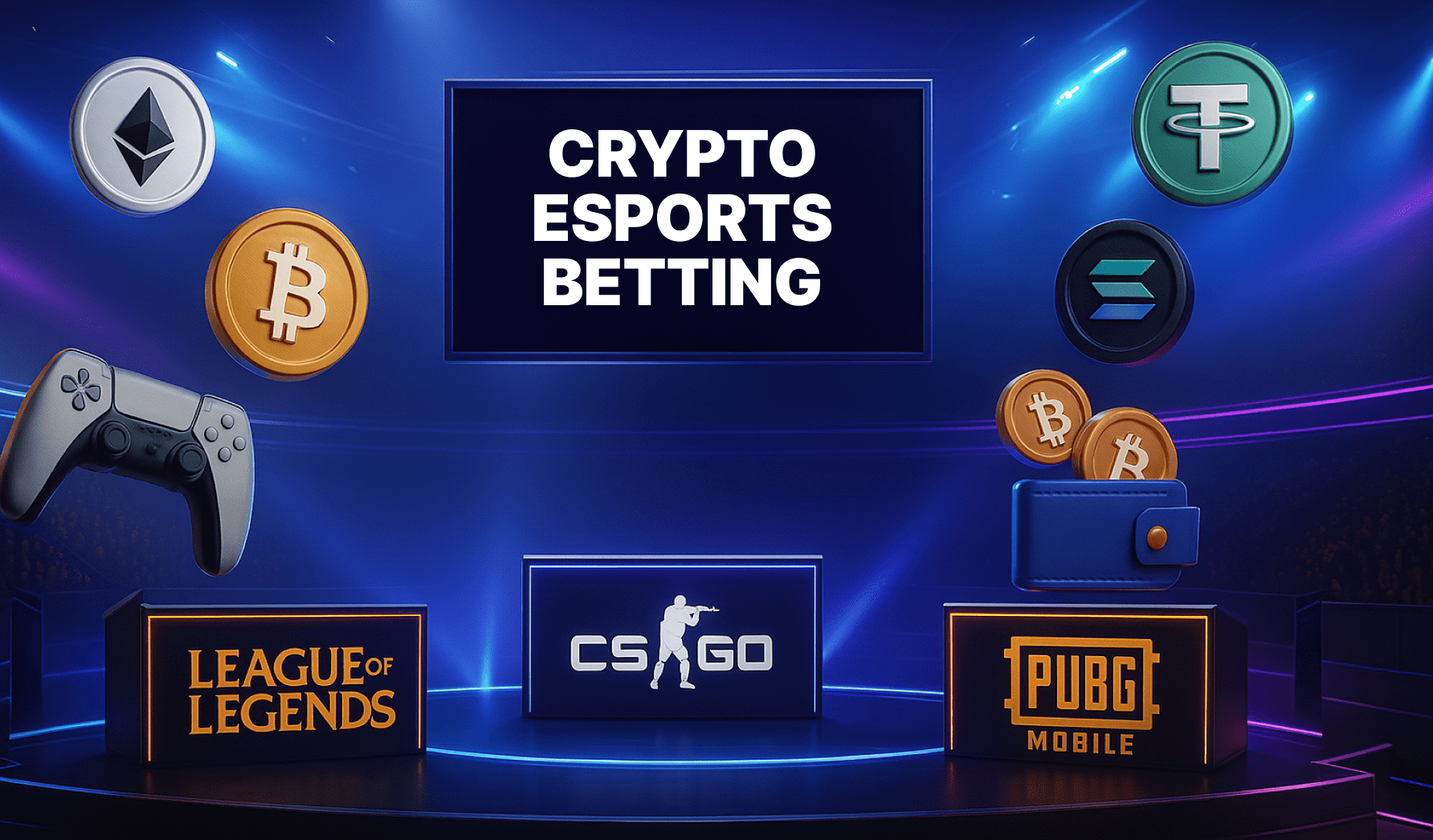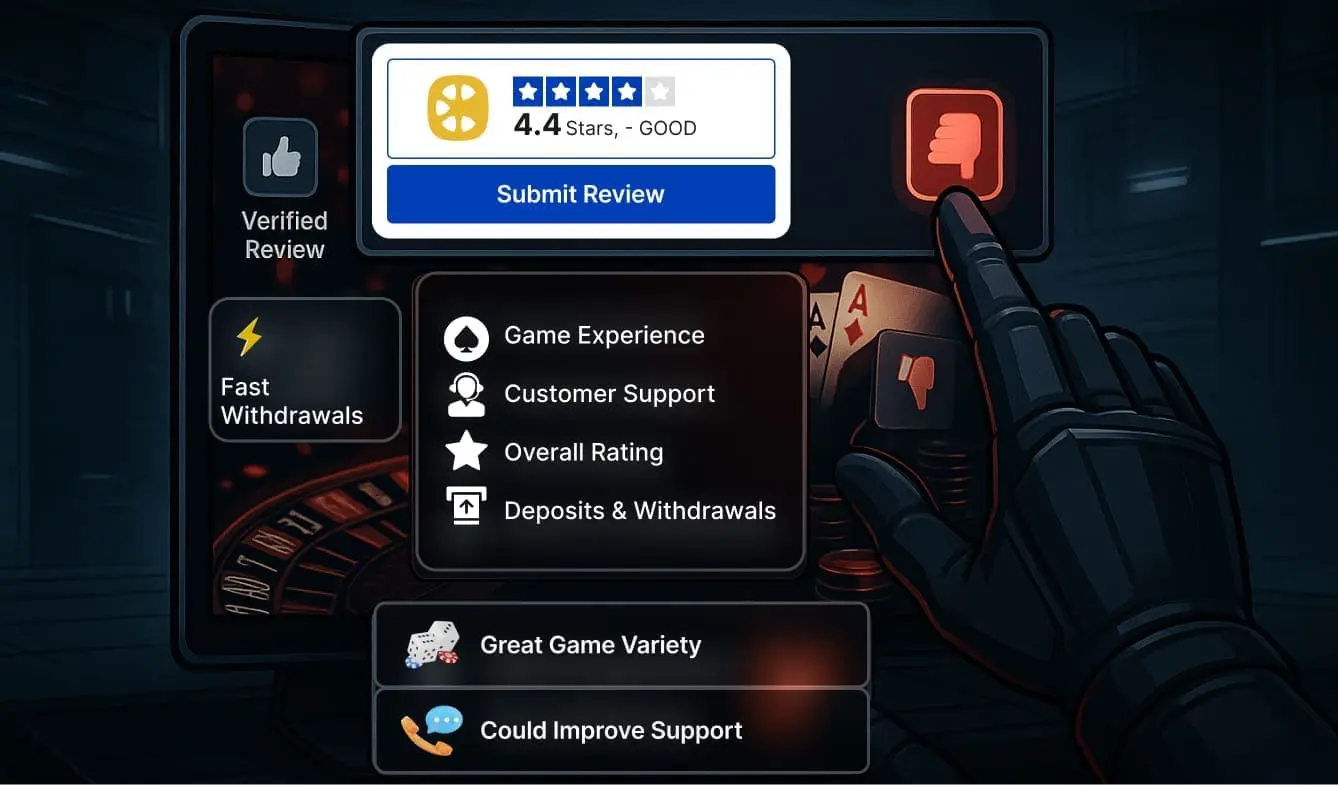
The Future of Crypto Gambling: Trends and Predictions for 2025 and Beyond
Ever wonder what the crypto gambling space will look like in a few years from now? Well, here at CoinBets.com we’ve been pondering this very thing. In this original article, we’ll make some predictions on where we think things are going as crypto, NFTs, DeFi and blockchain continue to transform online gambling.
The Emergence of Crypto Gambling
Before we strap ourselves into the DeLorean and accelerate to 88mph, let’s consider what’s happened in the crypto gambling industry to bring us to where we are now.
The online gambling world, or ‘iGaming’ world to use industry talk, has been at the cutting edge of innovation for a long time — driven by technological change and consumer demand.
Let’s not forget that the first fully functional gambling software was developed by Isle of Man-based Microgaming (now known as ‘Apricot’) way back in 1994, and the first online casinos were launched in that same year. That’s just four years after Marty McFly and the Doc released their final movie! Okay, I promise I’ll stop the Back to the Future references.
So, online gambling has been around for over three decades. But, it was only in 2012 that the first online crypto gambling game went live in the form of SatoshiDice (still available as a DApp). It was very basic, allowing players to place bets with Bitcoin directly on the blockchain. But it proved the concept of provably fair gaming.
Within just 5 years, some of the major crypto gambling brands we know and love today, like Stake and BC Game were already online.
To begin with, platforms accepted the OG cryptos like BTC, ETH and DOGE, latter adding stablecoins like USDT, and altcoins from ADA to TRON. Crucially, by offering well-designed platforms, with intuitive user interfaces and convenient apps, they made crypto gambling accessible to millions globally.
Before long, these crypto casinos were offering provably fair blockchain-based games from studios like InOut, Bgaming and Spribe, alongside traditional RNG (random number generator) based slots and table games, plus live dealer casino games. Most of the latter provided by familiar names like Pragmatic Play, Evolution and NetEnt. Some platforms also offered sports and esports betting — becoming one-stop gambling destinations.
Timeline
Key Moments That Shaped Crypto Gambling
2012
The OG of crypto gambling launches. Players can now bet directly on the Bitcoin blockchain, no middlemen, no friction.
2014
Game outcomes finally become verifiable. Players can check every roll, spin, or hand against the blockchain, trust becomes math.
2017
Stake, BC.Game, and others hit the scene. Multiple coins, thousands of games, and real crypto ecosystems take shape.
2021
Gambling meets Web3. Platforms start offering tradable NFT rewards, VIP passes, and tokenized game access.
2022
The fun catches up with the law. The UK, US, and others begin cracking down, compliance becomes a new game in itself.
2025
Despite pressure, crypto casinos thrive. Estimated market hits $400M+, but regulation, KYC, and trust are now center stage.
The State of Crypto Gambling in 2025
However, the honeymoon period of online crypto gambling was soon cut short as various major regulators, including those of the UK, Malta, Sweden, Germany and various US states, banned (or effectively banned) crypto.
The one conspicuous exception was Curaçao, which despite recently overhauling its regulatory regime, continues to license crypto casinos. And, that, leads us right up to today’s strange situation where crypto gambling is increasingly popular, but shunned by most mainstream regulators.
To give you an idea of exactly where we currently stand, according to Statista, the global gaming market went from $37 billion prior to the COVID-19 pandemic to over $70 billion in 2024, and is expected to reach over $150 billion in 2030. However, bets placed with fiat currencies still account for the vast majority of revenue.
But, given the rate of crypto and blockchain adoption globally, we can expect the crypto gambling market share to grow significantly in the coming years. So, let’s take a close look at the individual factors driving change, and how things might play out in the short to medium term.
The Rise of NFTs in Gambling
Non-fungible tokens (NFTs) are blockchain-based digital assets that are unique and can’t be divided. This differs from cryptocurrencies which can be divided into smaller parts. For example, bitcoin can be subdivided into satoshis, just like dollars can be divided into cents. However, it is just as easy to transfer ownership of an NFT as it is for cryptocurrencies, meaning they can be traded on secondary markets.
Thanks to the insane NFT boom during the pandemic period, most people still associate Non-Fungible Tokens with overhyped ‘art’ projects like the Bored Ape Yacht Club and faddish games like CryptoKitties.
But despite a dramatic crash in valuations and sales, NFTs have revolutionized the art and gaming worlds. And, their potential applications in the online gambling industry are only just beginning to be explored.
From Rewards to Creating Stakeholders
The simplest use of NFTs in the context of crypto gambling is for rewards. Unique digital assets can be awarded to players for loyalty, or as prizes in competitions — creating limitless opportunities for more gamification. If the gambling site has a large enough player base, secondary markets can even develop for these NFTs (as in the case of the MetaWinners NFTs from crypto casino MetaWin).
Smart contracts can be embedded in NFTs to give owners a stake in a gambling platform. They could enable holders to earn a percentage of the house edge, or give them special access to better odds or exclusive games. In fact, we’ve already seen the first experiments in this direction.
For example, in December 2021, Georgia-based (European Georgia, not the American state) software developer Elia Software launched Sloties via a casino of the same name. Sloties are art NFTs featuring unique slot machine-inspired characters, that also entitle the holder to a share of profits from the casino.
Despite running into legal hurdles, most notably being issued with cease and desist orders from the state securities regulators of Texas, New Jersey, Kentucky, and Alabama, a healthy secondary market has developed. For example, Slotie NFTs regularly trade on the popular NFT marketplace LooksRare.
Another interesting possible application of NFTs is as tradable items in betting scenarios. For example, sportsbooks could offer NFTs that represent a bet on a specific outcome. This would enable the bets to be traded in real-time before the outcome of the event is decided, creating a new and dynamic market for bettors.
Looking Ahead
Despite the clear potential of NFTs to transform the crypto gambling sector, progress will be limited by the continued regulatory uncertainty in many jurisdictions.
Indeed, as long as most major gambling regulators oppose the use of cryptocurrencies and digital assets at licensed platforms, the potential of NFTs can’t be realized. In the meantime, unregulated and lightly regulated casinos and sports books will be able to build an even bigger lead over their strictly regulated competitors.
Digital assets you truly own, unique, non-fungible, and stored on-chain. Unlike crypto coins, no two NFTs are the same.
Win loyalty NFTs, exclusive skins, or collectible assets, and flip them on secondary markets for real value.
Own part of the house. Some NFTs now give holders a cut of casino revenue via smart contracts.
Wager with NFTs instead of tokens. Trade them mid-game. Sell your position before the outcome. Pure Web3 gambling mechanics.
Crypto & DeFi Integration: A New Financial Paradigm
Considering the traditional financial system is one of the main pain points for both gambling operators and players, cryptocurrencies hold enormous potential in the space.
The most obvious benefit of this is allowing both casino/sportsbook operators and players to bypass the traditional financial system for deposits and withdrawals. This can save a significant amount on transaction fees, and make the entire process faster and more secure. Depending on the regulatory regime the site is operating under, it can also provide players with a degree of anonymity.
Decentralized Finance, better known as ‘DeFi’, is one of the most profound developments in the blockchain space. Thanks to smart contracts, DeFi platforms can offer a huge variety of financial services — including lending (for example, BetFury offers crypto loans), borrowing, and trading. All without the involvement of traditional financial intermediaries like banks.
P2P Betting, Liquidity Pools and Staking
Decentralized betting platforms can enable players to place wagers directly with each other, bypassing the need for a house (aka the gambling site operator). This peer-to-peer (P2P) model can significantly reduce costs and increase transparency.
All bets and transactions are recorded immutably on the blockchain, and game results are verifiable by players. It also adds that all-important social aspect to online betting — as exemplified by the popular social betting platform Kutt.
Beyond the core concept of peer-to-peer betting, decentralized gambling platforms also provide other opportunities. In fact, decentralized betting platforms can take a lead from decentralized crypto exchanges (DEXs) like SushiSwap, PancakeSwap and Curve Finance.
For example, staking is a core DeFi concept that can be integrated into gambling platforms. Players could stake their cryptocurrency with platform’s smart contract to earn a share of the house edge or other rewards. This creates a more engaging experience, as players have a financial stake in the platform’s success. Liquidity pools funded by players can also help keep platforms stable and independent – removing the need for commercial investors.
Looking Ahead
While DeFi elements will continue to be integrated into the crypto gambling ecosphere, progress will be slow due to one major factor. DeFi is complicated.
Whichever way you look at it, the learning curve can be steep. Of course, once you’ve immersed yourself in the space and are used to it, it’s easy. And, there’s little doubt that things like generating a yield from staking are attractive. But, its still alien territory to many people (especially regulators and politicians).
Because of this, we expect to see innovators in the space, including iGaming businesses, invest heavily in awareness and education over the next few years.
DeFi-Powered
Gambling Platform
Skip the middleman. Bet directly against other players – no house, no rake, just smart contracts.
Back the action. Provide liquidity to fuel the bets, and get a slice of the profits in return.
Lock your tokens, earn yield. Support the platform and collect passive rewards while others play.
The Growth of Prediction Markets
One of the most pronounced recent gambling trends has been the rising popularity of prediction market platforms like Polymarket and Kalshi. Also known as betting markets, decision markets, event derivatives, or idea futures, they allow participants to bet on the outcome of all types of events.
Prices for prediction markets fluctuate — with the value of the bet determined by the collective wisdom of the market (or the “Wisdom of Crowds” as James Surowiecki put it). By aggregating many different opinions, this reliance on the principle of collective intelligence often leads to more accurate predictions than those made by individuals.
Hence, the decentralized nature of blockchain and crypto is ideally suited to facilitating this kind of betting — removing the possibility for one party to unduly influence or manipulate markets.
Looking Ahead:
Again, while we’re likely to see blockchain and crypto gambling fuel the growth of prediction markets, it will be tempered by regulatory uncertainty.
In particular, the nature of prediction markets inherently blurs the line between traditional gambling and investing. This could cause jurisdictional confusion among authorities. On the other hand, operators could harness it to add more social legitimacy to gambling.
How it works
Polymarket x DeFi Betting
Who will be President
of USA in 2025
Step 1
Bet on events like elections, sports, or crypto price moves by buying shares (e.g. “Yes” for $0.60). The closer you are to being right, the more your shares are worth.
Step 2
Think the odds shifted in your favor? Flip your shares before resolution to lock in profits, just like trading on a sportsbook with a cash-out button, but on-chain.
Step 3
When the event ends, smart contracts settle the result. If you were right, your $0.60 share pays out $1. No delays. No disputes.
Enhanced Privacy and Anonymity
Privacy and anonymity have always been important considerations for online gamblers, but they are even more acute in the crypto age. This is partly due to the new technology leading to different expectations, and partly due to the increasing prevalence of both identity theft and the surveillance state.
One of the key benefits of using cryptocurrency for online gambling has always been the ability to transact without providing personally identifiable information. These pseudonymous transactions inherently reduce the risk of identity theft or fraud. Because even if an online casino is legitimate, the sensitive data they hold makes them a prime targets for hackers.
When it comes to crypto gambling, advancements in blockchain technology are now further enhancing privacy.
Zero-Knowledge Proofs
Zero-knowledge proofs (ZKPs) are a cryptographic technique that allows one party to prove to another that a statement is true without revealing additional information. This could be used to verify that a player has sufficient funds to place a bet without revealing their entire wallet balance or transaction history.
If you’re interested in learning more about ZKPs, you can read a detailed explanation of how Chainlink’s DECO technology works.
Privacy Coins
Taking anonymity to an even higher level of so-called privacy coins like Monero and Zcash. These employ advanced cryptographic techniques to obfuscate transaction details, making it extremely difficult for third parties to trace transactions to individual users.
Most crypto casinos don’t accept privacy coins, but those that do are increasingly popular with privacy-conscious gamblers.
Looking Ahead
Despite a growing demand for privacy and impressive technological innovations, it seems likely players will face increasingly intrusive requirements.
In the name of combating illicit activities, authorities around the world will continue to pressure gambling platforms to implement stricter Know Your Customer (KYC) and Anti-Money Laundering (AML) measures. For example, in 2025, even Curacao-licensed crypto casinos introduced mandatory identity verification before a first withdrawal.
In fact, if current trends continue, we may even see direct action taken against offshore gambling operators. For example, we could see US authorities, in particular, try to shut down KYC-free crypto casinos using the same tactics employed against cryptocurrency mixers (e.g., Samourai Wallet).
Prove it happened – without revealing anything. ZKPs let players verify transactions or outcomes without exposing personal or wallet info.
Use Monero, Zcash, or Dash to keep your gambling truly anonymous. No exposed wallet trails. No blockchain snooping.
Some casinos now ditch invasive ID checks. Less friction, more privacy – without compromising gameplay or cashouts.
Regulatory Challenges and Opportunities
The biggest obstacles to most things in the crypto gambling space stem from regulation. Sometimes it’s over-regulation, sometimes it’s unclear regulation, and sometimes it’s, well, a complete lack of any regulation.
Decentralized Tech vs Geographically Defined Regulations
The fundamental challenge is the same as the internet faces in general. Although the online space is borderless, there are hundreds of geographically-defined jurisdictions on the planet. And, those running different jurisdictions often have very different viewpoints and levels of understanding.
This is especially true when it comes to rapidly developing, complex technologies. In the case of decentralized blockchains, which essentially exist everywhere and nowhere at the same time, it causes particular issues.
Take, for example, the absurd situation we now see with crypto gambling in the UK. Despite the country being a crypto business hub, UKGC-licensed gambling platforms are effectively unable to support cryptocurrencies due to overbearing regulations. All while UK gamblers can easily access offshore crypto gambling platforms.
Even the iGaming hub of Malta, which for several years tried to brand itself as ‘Blockchain Island‘, has been very hesitant to allow gambling operators to accept crypto.
The same dysfunctional situation can be seen across the world. Even as late as 2025, very few places had introduced truly coherent regulations.
SROs — The Logical Regulatory Solution for a Decentralized Industry?
However, despite the lack of progress so far, the regulatory landscape does present opportunities for innovation. For example, self-regulatory organizations (SROs) — industry-led bodies that develop and enforce standards for their members — could be established.
These aren’t a new concept, for example, the New York Stock Exchange (NYSE), the American Council of Life Insurers (ACLI), and the Financial Industry Regulatory Authority(FINRA) are all examples of SROs.
By harnessing blockchain technology and adopting best practices for transparency, fairness, and responsible gambling, crypto gambling SROs could build trust with regulators and players alike. This could also help to create a more level playing field, where operators are held to consistent standards, regardless of where they are geographically based.
Of course, blockchain and smart contracts also have the potential to help gambling operators in terms of compliance with existing regulatory requirements. For example, they can be used to ensure payouts are calculated fairly and that responsible gambling rules, like betting limits, are automatically enforced.
Looking Ahead
Regulatory issues are likely to remain a serious pain point for the crypto gambling industry. Even if some jurisdictions do introduce clear rules, unless the majority do, there’s still going to be a lot of friction.
A great deal is likely to come down to how the industry itself behaves. If regulators, politicians, and the mainstream media feel operators are taking advantage, they’ll probably make life more difficult. On the other hand, if the industry acts with tact, and focuses on education about the benefits of crypto and blockchain, it could be a different story.
The Role of Al and Machine Learning
Unless you’ve been living under a rock for the past couple of years, you’ll have noticed the AI Age has well and truly arrived. Indeed, Artificial Intelligence (Al) and Machine Learning (ML) are rapidly transforming virtually all industries, and online gambling is no exception.
Granular Data and Personalization
One of the most promising applications of Al in crypto gambling is the ability to efficiently create personalized experiences for players.
By constantly analyzing huge amounts of both historical and real-time granular data on player behavior, Al algorithms can tailor things like game recommendations and bonuses to individual preferences. Critically, this can be done at a cost, speed and scale not previously imaginable.
Addressing Too Much Choice
This will help address information overload or fatigue — a growing problem for everything from e-commerce to streaming services. For example, people often complain about being unable to make decisions when using Temu or Netflix due to the sheer amount of choice.
In fact, in 2025, crypto exchange Kraken heavily advertised its pre-selected altcoin bundles as a way to avoid what it termed “analysis paralysis”. And considering it’s not unusual for a crypto casino to offer up to 15,000 slots and other casino games, it’s easy to see how better personalization would be a big help.
More Effective Marketing
In addition to providing a less stressful experience for players, the technology also has the potential to make marketing much more efficient for gambling companies.
Indeed, highlighting just how important this is, in a June 2024 interview with iGB, Alex Kornilov, CEO of advertising solutions supplier Betegy, explained:

“Currently the acquisition strategy of every brand, especially in the United States, leads from spending money and seeing what sticks, which brings a lot of uncertainty at the brand level and no possibility to really tell what works and what doesn’t… That’s why for example, last year there was a crisis on the acquisition side. If we acquire a player at 300 bucks and the lifetime value is ten, how long can we sustain this kind of aggressive growth?”
Improved Security
Al can also be used to enhance the security of crypto gambling platforms. Fraud is a big problem in the online gambling industry, hurting both operators and players.
However, Al algorithms are particularly well-suited to identifying suspicious behavior. By analyzing patterns of play, Al systems can efficiently detect anomalies that may indicate cheating, collusion, or other forms of fraud.
Responsible Gambling
Similarly, when it comes to tackling problem gambling, Al and ML can again tap their ability to analyse massive amounts of data and spot patterns that humans could easily miss.
Several Al- based responsible gambling tools are already used by online gambling operators, and judging from their performance so far, adoption will only accelerate.
Demonstrating how effective machine learning can be in detecting early signs of problem gambling, a 2024 study in the Journal of Gambling Studies, Máté Cs. Sándor & Barna Bakó, noted:

“Machine learning approaches, such as the ones used in this study, offer an easy-to- implement monitoring tool for gambling platforms. These models can serve as a foundation for implementing proactive measures, such as nudging or forced exemptions, to deter at-risk gamblers from developing or continuing problem gambling behaviors. By identifying players early on who show signs of problematic gambling, operators can provide targeted interventions and support to promote responsible gambling practices and minimize harm.”
More Efficient Game Development
From the perspective of casino game providers, Al is also revolutionizing design, testing, and production.
Whether it’s developing complex new game mechanics and math, to creating graphics and sounds, Al is streamlining processes. And, while this probably isn’t good news for many working in the industry, it’s going to result in players having more choice than ever.
In fact, while AI game development tools may see large providers cut their workforces, it may lead to the launch of many new, smaller studios. In fact, Stake has taken things a step further by launching SlotGPT — a service that allows casino users to design their own slot games without any special skills.
Potential Problems with AI
However, Al and ML also present more prickly possibilities. Specifically, because Al can analyze enormous data sets, extremely quickly.
AI’s ability to spot trends and patterns in historical betting information can be used to improve betting strategies, odds calculations, and the fairness of the gambling process. But, logically, the same capabilities could be used to very subtly exploit vulnerable individuals and encourage problem gambling.
And it might not even be deliberate. For example, AI tools may inadvertently compound problem gambling by personalizing products too much.
Looking Ahead
Al promises to both improve experiences for players, and make gambling businesses more efficient. From improving individualization to cutting operational costs, it’s going to have a huge impact over time.
But, Al systems need to be designed and implemented in a way that prioritizes responsible gambling and protects players from harm. And that’s going to be challenging, to say the least. It’s likely that some crypto gambling sites will cause issues by deploying Al tech without sufficient safeguards.
Game Recommendation
AI tracks your gameplay and suggests games you’ll actually enjoy — cutting through the clutter for a faster, better experience.
AI in Security and Fraud Detection
AI sniffs out suspicious behavior, bots, and multi-account abuse before it becomes a threat — protecting both the casino and the player.
Responsible Gambling Tools
AI detects risky behavior early and triggers alerts or limits — keeping players in control without killing the fun.
AI in Game Development
AI is reshaping how games are built, from smarter odds balancing to dynamic content and real-time A/B testing.
Final Thoughts
Looking to the next few years, it’s clear the crypto gambling industry is entering exciting times. Crypto and blockchain have already been driving the emergency of the decentralized Web3 for years, things are now being catalyzed by Al.
Tradable NFTs, prediction markets, social integrations, hyper-personalization, and increased transparency and security will continue to reduce the negative perception of gambling. And we’ll see a continuing convergence of gaming, finance, and technology.
However, regulation will remain a stumbling block. At some point, regulators will probably conclude they are better off working with DeFi, tokenized projects, and crypto gambling platforms, rather than against them. But, it’s probably going to take a while.
In the meantime, innovation will continue to be driven by players and individual platforms — often on the fringes of the industry. But, from those fringes, the giants of tomorrow will rise. And we very much doubt they will look anything like Stake.
Like we said, exciting times!
What do you think the future of crypto gambling looks like? Comment below and let us know.
Join The Conversation
No comments yet. Be the first to comment!
 Continue with Apple
Continue with Apple Continue with Google
Continue with Google


Comments (0)
Share